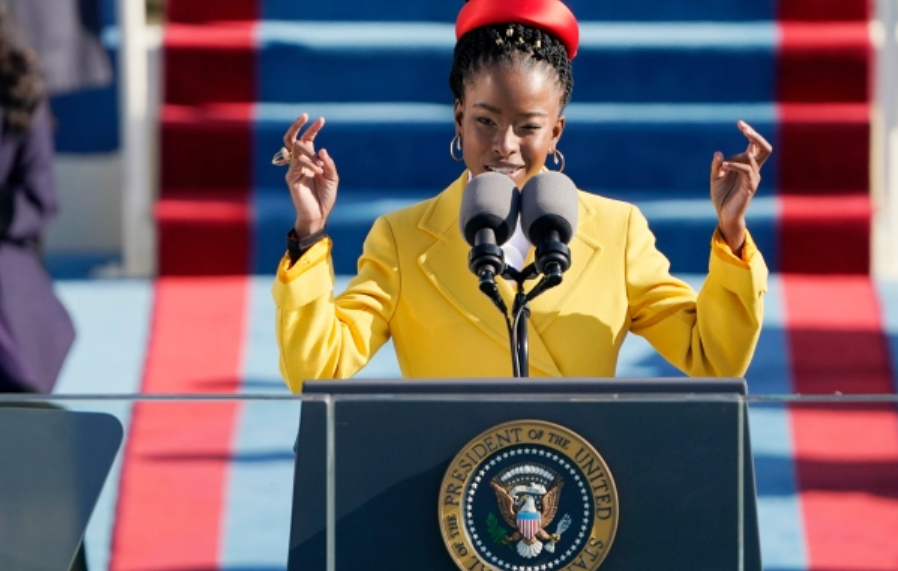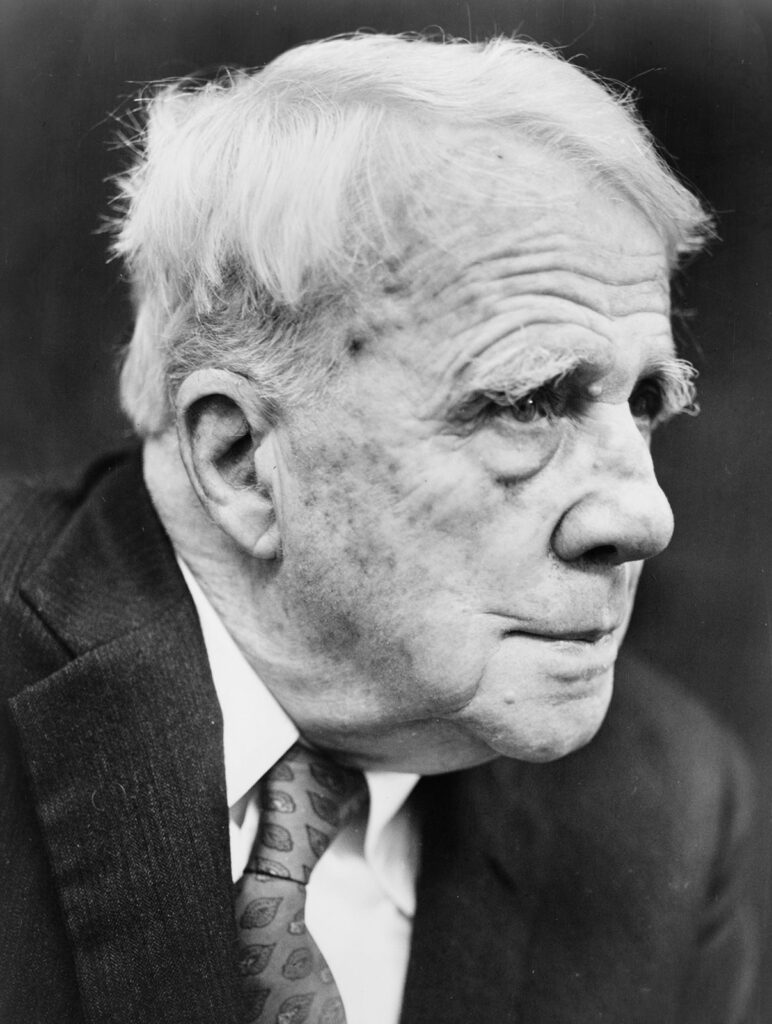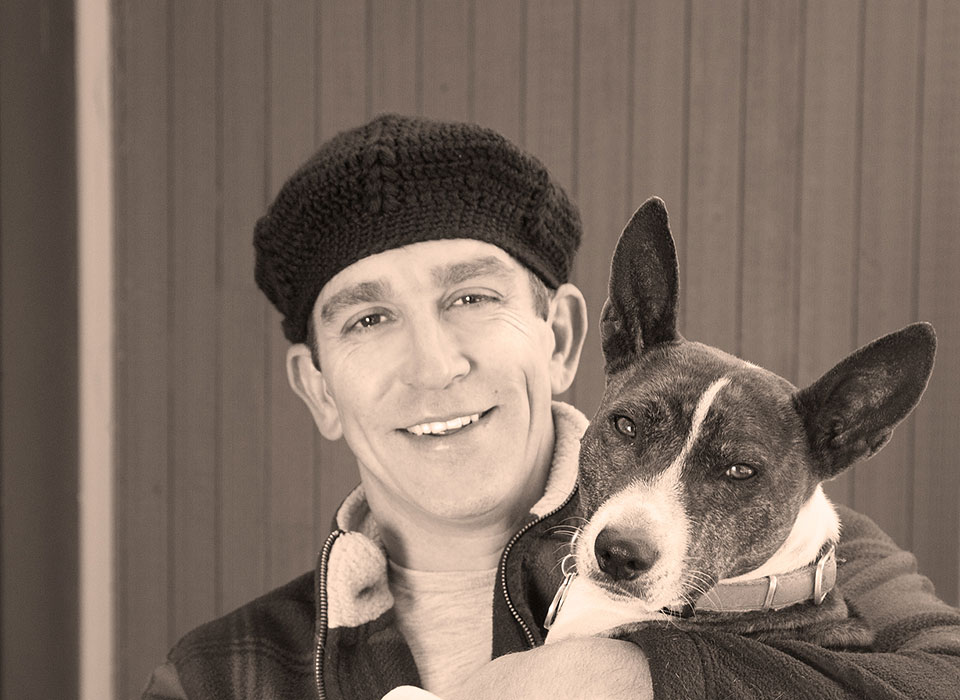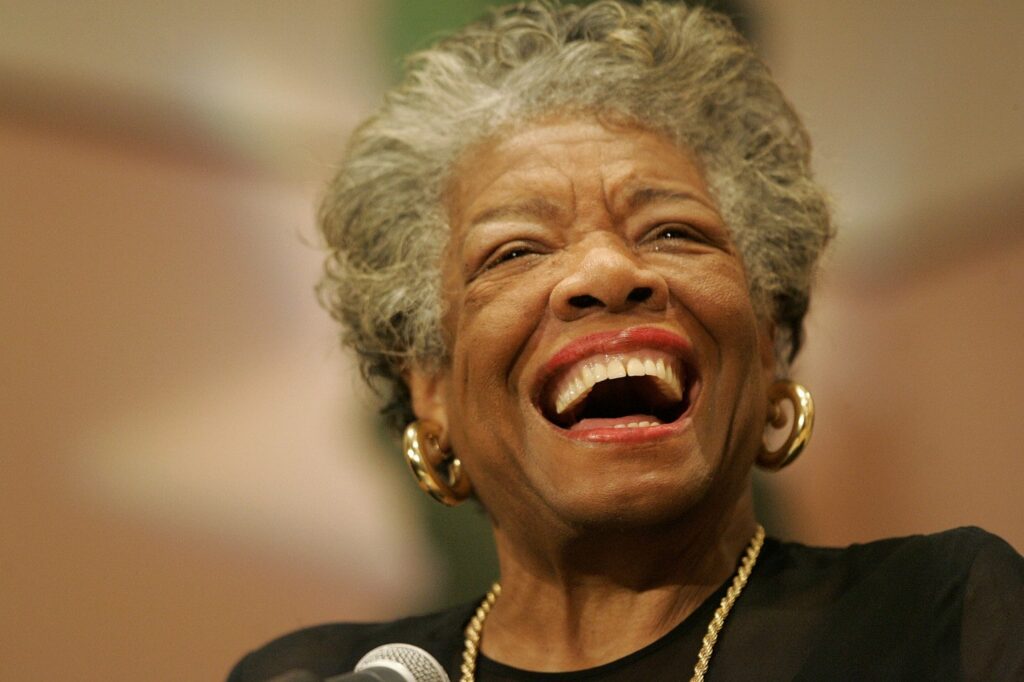Hvad er inaugural Poetry? Der er mange traditioner omkring indsættelsen af en amerikansk præsident, digtoplæsninger er en af de mere perifere. Faktisk har kun fire præsidenter — John F. Kennedy i 1961, Bill Clinton i 1993 og 1997, Barack Obama i 2009 og 2013 og Joe Biden i 2021 — valgt at have en digter til at læse op ved indsættelsesceremonien.
Indsættelsen af en ny præsident skaber baggrund for at reflektere over landets tilstand og sætte en retning, men giver samtidig et indblik i de værdier der præger den nye leder. De præsidenter, som har valgt en inaugural poet, har ofte været optaget af litteratur, kunst, viden og uddannelse.
Efter den tumult der har præget de sidste fire år er det ikke tilfældigt, at Amanda Gormans digt “The Hill we Climb” stjal billedet ved Joe Bidens indsættelse. Den 22-årige digter og aktivist træder direkte ind på verdensscenen med et digt, der nærmest kommer til at stå som et sindbillede på 2021.

Healing Conflict
Amanda Gormans lejlighedsdigt skriver sig selvfølgelig ind i Biden administrationens grundværdier: plurality, unity og healing. På mange blev Bidens indsættelse et åndehul fra en hverdag fyldt med monumentale udfordringer og et blik ind i en verden, hvor der stadig er håb om forsoning. På den baggrund kan man sammenligne “The Hill we Climb” med andre digte som tematiserer problemerne ved at mødes på tværs af konflikt og forskellighed.
Umiddelbart kommer jeg til at tænke på Robert Frosts “Mending Wall” med det paradoksale budskab “Good fences makes good neighbours”. Skrevet i udkanten af første verdenskrig bliver naboernes årlige ritual med at reparere muren mellem deres marker på engang symbol på adskillelse og samarbejde.
Something there is that doesn’t love a wall,
Robert Frost, Mending Wall (1914)
That sends the frozen-ground-swell under it,
And spills the upper boulders in the sun;
And makes gaps even two can pass abreast.
The work of hunters is another thing:
I have come after them and made repair
Where they have left not one stone on a stone,
But they would have the rabbit out of hiding,
To please the yelping dogs. The gaps I mean,
No one has seen them made or heard them made,
But at spring mending-time we find them there.
I let my neighbor know beyond the hill;
And on a day we meet to walk the line
And set the wall between us once again.
We keep the wall between us as we go.
To each the boulders that have fallen to each.
And some are loaves and some so nearly balls
We have to use a spell to make them balance:
‘Stay where you are until our backs are turned!’
We wear our fingers rough with handling them.
Oh, just another kind of out-door game,
One on a side. It comes to little more:
There where it is we do not need the wall:
He is all pine and I am apple orchard.
My apple trees will never get across
And eat the cones under his pines, I tell him.
He only says, ‘Good fences make good neighbors.’
Spring is the mischief in me, and I wonder
If I could put a notion in his head:
‘Why do they make good neighbors? Isn’t it
Where there are cows? But here there are no cows.
Before I built a wall I’d ask to know
What I was walling in or walling out,
And to whom I was like to give offense.
Something there is that doesn’t love a wall,
That wants it down.’ I could say ‘Elves’ to him,
But it’s not elves exactly, and I’d rather
He said it for himself. I see him there
Bringing a stone grasped firmly by the top
In each hand, like an old-stone savage armed.
He moves in darkness as it seems to me,
Not of woods only and the shade of trees.
He will not go behind his father’s saying,
And he likes having thought of it so well
He says again, ‘Good fences make good neighbors.’
Gennem valgkampagnen har Joe Biden ikke lagt skjul på sin forkærlighed for irske digtere og flere gange citeret Seamus Heaney på sin vej rundt på the campaign trail. Det er dog Michael Longleys reaktion på våbenhvilen i den nordirske konflikt, som jeg først kommer til at tænke på i kølvandet på “The Hill we Climb”.
I digtet “Ceasefire” sætter Longley en mytologisk ramme omkring den brutale borgerkrig som gennem generationer har flået Nordirland fra hinanden og maner til forståelse og tilgivelse gennem billedet af mødet mellem Akilles og Priamos – – drabsmanden og offerets far.
I
Put in mind of his own father and moved to tears
Achilles took him by the hand and pushed the old king
Gently away, but Priam curled up at his feet and
Wept with him until their sadness filled the building.II
Taking Hector’s corpse into his own hands Achilles
Made sure it was washed and, for the old king’s sake,
Laid out in uniform, ready for Priam to carry
Wrapped like a present home to Troy at daybreak.III
When they had eaten together, it pleased them both
To stare at each other’s beauty as lovers might,
Achilles built like a god, Priam good-looking still
And full of conversation, who earlier had sighed:IV
Michael Longley, Ceasefire (1998)
‘I get down on my knees and do what must be done
And kiss Achilles’ hand, the killer of my son.’
Lesson Plans og Baggrund
Jeg har i det følgende plukket lidt eksempler til et forløb om Inaugural Poetry. Hvis du vil mere i dybden vil jeg klart anbefale at dykke ned i The Academy of American Poets‘ website med historisk baggrund, tekster og plug-and-play lesson plans. Hvis du vil nøjes med at arbejde med Amanda Gorman, kan jeg anbefale disse lektionsplaner og opgaver fra PBS.
Amanda Gorman: The Hill we Climb
When day comes, we ask ourselves where can we find light in this never-ending shade?
The loss we carry, a sea we must wade.
We’ve braved the belly of the beast.
We’ve learned that quiet isn’t always peace,
and the norms and notions of what “just” is isn’t always justice.
And yet, the dawn is ours before we knew it.
Somehow we do it.
Somehow we’ve weathered and witnessed a nation that isn’t broken,
but simply unfinished.
We, the successors of a country and a time where a skinny Black girl descended from slaves and raised by a single mother can dream of becoming president, only to find herself reciting for one.And yes, we are far from polished, far from pristine,
but that doesn’t mean we are striving to form a union that is perfect.
We are striving to forge our union with purpose.
To compose a country committed to all cultures, colors, characters, and conditions of man.
And so we lift our gazes not to what stands between us, but what stands before us.
We close the divide because we know, to put our future first, we must first put our differences aside.
We lay down our arms so we can reach out our arms to one another.
We seek harm to none and harmony for all.
Let the globe, if nothing else, say this is true:
That even as we grieved, we grew.
That even as we hurt, we hoped.
That even as we tired, we tried.
That we’ll forever be tied together, victorious.
Not because we will never again know defeat, but because we will never again sow division.Scripture tells us to envision that everyone shall sit under their own vine and fig tree and no one shall make them afraid.
If we’re to live up to our own time, then victory won’t lie in the blade, but in all the bridges we’ve made.
That is the promise to glade, the hill we climb, if only we dare.
It’s because being American is more than a pride we inherit.
It’s the past we step into and how we repair it.
We’ve seen a force that would shatter our nation rather than share it.
Would destroy our country if it meant delaying democracy.
This effort very nearly succeeded.
But while democracy can be periodically delayed,
it can never be permanently defeated.
In this truth, in this faith, we trust,
for while we have our eyes on the future, history has its eyes on us.
This is the era of just redemption.
We feared it at its inception.
We did not feel prepared to be the heirs of such a terrifying hour,
but within it, we found the power to author a new chapter, to offer hope and laughter to ourselves.
So while once we asked, ‘How could we possibly prevail over catastrophe?’ now we assert, ‘How could catastrophe possibly prevail over us?’We will not march back to what was, but move to what shall be:
A country that is bruised but whole, benevolent but bold, fierce and free.
We will not be turned around or interrupted by intimidation because we know our inaction and inertia will be the inheritance of the next generation.
Our blunders become their burdens.
But one thing is certain:
If we merge mercy with might, and might with right, then love becomes our legacy and change, our children’s birthright.So let us leave behind a country better than the one we were left.
Recited at the inauguration of Joe Biden in 2021
With every breath from my bronze-pounded chest, we will raise this wounded world into a wondrous one.
We will rise from the golden hills of the west.
We will rise from the wind-swept north-east where our forefathers first realized revolution.
We will rise from the lake-rimmed cities of the midwestern states.
We will rise from the sun-baked south.
We will rebuild, reconcile, and recover.
In every known nook of our nation, in every corner called our country,
our people, diverse and beautiful, will emerge, battered and beautiful.
When day comes, we step out of the shade, aflame and unafraid.
The new dawn blooms as we free it.
For there is always light,
if only we’re brave enough to see it.
If only we’re brave enough to be it.
Other Inaugural Poets
Robert Frost: The Gift Outright
The land was ours before we were the land’s
recited at the inauguration of John F. Kennedy in 1961
She was our land more than a hundred years
Before we were her people. She was ours
In Massachusetts, in Virginia,
But we were England’s, still colonials,
Possessing what we still were unpossessed by,
Possessed by what we now no more possessed.
Something we were withholding made us weak
Until we found out that it was ourselves
We were withholding from our land of living,
And forthwith found salvation in surrender.
Such as we were we gave ourselves outright
(The deed of gift was many deeds of war)
To the land vaguely realizing westward,
But still unstoried, artless, unenhanced,
Such as she was, such as she will become.
Maya Angelou: On the Pulse of Morning
A Rock, A River, A Tree
Hosts to species long since departed,
Marked the mastodon,
The dinosaur, who left dried tokens
Of their sojourn here
On our planet floor,
Any broad alarm of their hastening doom
Is lost in the gloom of dust and ages.But today, the Rock cries out to us, clearly, forcefully,
Come, you may stand upon my
Back and face your distant destiny,
But seek no haven in my shadow.
I will give you no hiding place down here.You, created only a little lower than
The angels, have crouched too long in
The bruising darkness
Have lain too long
Face down in ignorance.
Your mouths spilling wordsArmed for slaughter.
The Rock cries out to us today, you may stand upon me,
But do not hide your face.Across the wall of the world,
A River sings a beautiful song. It says,
Come, rest here by my side.Each of you, a bordered country,
Delicate and strangely made proud,
Yet thrusting perpetually under siege.
Your armed struggles for profit
Have left collars of waste upon
My shore, currents of debris upon my breast.
Yet today I call you to my riverside,
If you will study war no more. Come,
Clad in peace, and I will sing the songs
The Creator gave to me when I and the
Tree and the rock were one.
Before cynicism was a bloody sear across your
Brow and when you yet knew you still
Knew nothing.
The River sang and sings on.There is a true yearning to respond to
The singing River and the wise Rock.
So say the Asian, the Hispanic, the Jew
The African, the Native American, the Sioux,
The Catholic, the Muslim, the French, the Greek
The Irish, the Rabbi, the Priest, the Sheik,
The Gay, the Straight, the Preacher,
The privileged, the homeless, the Teacher.
They hear. They all hear
The speaking of the Tree.They hear the first and last of every Tree
Speak to humankind today. Come to me, here beside the River.
Plant yourself beside the River.Each of you, descendant of some passed
On traveller, has been paid for.
You, who gave me my first name, you,
Pawnee, Apache, Seneca, you
Cherokee Nation, who rested with me, then
Forced on bloody feet,
Left me to the employment of
Other seekers—desperate for gain,
Starving for gold.
You, the Turk, the Arab, the Swede, the German, the Eskimo, the Scot,
You the Ashanti, the Yoruba, the Kru, bought,
Sold, stolen, arriving on the nightmare
Praying for a dream.
Here, root yourselves beside me.
I am that Tree planted by the River,
Which will not be moved.
I, the Rock, I the River, I the Tree
I am yours—your passages have been paid.
Lift up your faces, you have a piercing need
For this bright morning dawning for you.
History, despite its wrenching pain
Cannot be unlived, but if faced
With courage, need not be lived again.Lift up your eyes upon
This day breaking for you.
Give birth again
To the dream.Women, children, men,
Take it into the palms of your hands,
Mold it into the shape of your most
Private need. Sculpt it into
The image of your most public self.
Lift up your hearts
Each new hour holds new chances
For a new beginning.
Do not be wedded forever
To fear, yoked eternally
To brutishness.The horizon leans forward,
Offering you space to place new steps of change.
Here, on the pulse of this fine day
You may have the courage
To look up and out and upon me, the
Rock, the River, the Tree, your country.
No less to Midas than the mendicant.
No less to you now than the mastodon then.Here, on the pulse of this new day
Recited at the inauguration of Bill Clinton in 1993
You may have the grace to look up and out
And into your sister’s eyes, and into
Your brother’s face, your country
And say simply
Very simply
With hope—
Good morning.
Richard Blanco: On Today
One sun rose on us today, kindled over our shores,
peeking over the Smokies, greeting the faces
of the Great Lakes, spreading a simple truth
across the Great Plains, then charging across the Rockies.
One light, waking up rooftops, under each one, a story
told by our silent gestures moving behind windows.My face, your face, millions of faces in morning’s mirrors,
each one yawning to life, crescendoing into our day:
pencil-yellow school buses, the rhythm of traffic lights,
fruit stands: apples, limes, and oranges arrayed like rainbows
begging our praise. Silver trucks heavy with oil or paper—
bricks or milk, teeming over highways alongside us,
on our way to clean tables, read ledgers, or save lives—
to teach geometry, or ring-up groceries as my mother did
for twenty years, so I could write this poem.All of us as vital as the one light we move through,
the same light on blackboards with lessons for the day:
equations to solve, history to question, or atoms imagined,
the “I have a dream” we keep dreaming,
or the impossible vocabulary of sorrow that won’t explain
the empty desks of twenty children marked absent
today, and forever. Many prayers, but one light
breathing color into stained glass windows,
life into the faces of bronze statues, warmth
onto the steps of our museums and park benches
as mothers watch children slide into the day.One ground. Our ground, rooting us to every stalk
of corn, every head of wheat sown by sweat
and hands, hands gleaning coal or planting windmills
in deserts and hilltops that keep us warm, hands
digging trenches, routing pipes and cables, hands
as worn as my father’s cutting sugarcane
so my brother and I could have books and shoes.The dust of farms and deserts, cities and plains
mingled by one wind—our breath. Breathe. Hear it
through the day’s gorgeous din of honking cabs,
buses launching down avenues, the symphony
of footsteps, guitars, and screeching subways,
the unexpected song bird on your clothes line.Hear: squeaky playground swings, trains whistling,
or whispers across café tables, Hear: the doors we open
for each other all day, saying: hello / shalom,
buon giorno / howdy / namaste / or buenos días
in the language my mother taught me—in every language
spoken into one wind carrying our lives
without prejudice, as these words break from my lips.One sky: since the Appalachians and Sierras claimed
their majesty, and the Mississippi and Colorado worked
their way to the sea. Thank the work of our hands:
weaving steel into bridges, finishing one more report
for the boss on time, stitching another wound
or uniform, the first brush stroke on a portrait,
or the last floor on the Freedom Tower
jutting into a sky that yields to our resilience.One sky, toward which we sometimes lift our eyes
tired from work: some days guessing at the weather
of our lives, some days giving thanks for a love
that loves you back, sometimes praising a mother
who knew how to give, or forgiving a father
who couldn’t give what you wanted.We head home: through the gloss of rain or weight
Recited at the INauguration of Barack Obama in 2013
of snow, or the plum blush of dusk, but always—home,
always under one sky, our sky. And always one moon
like a silent drum tapping on every rooftop
and every window, of one country—all of us—
facing the stars
hope—a new constellation
waiting for us to map it,
waiting for us to name it—together
Elizabeth Alexander: Praise Song for the Day
Each day we go about our business,
walking past each other, catching each other’s
eyes or not, about to speak or speaking.All about us is noise. All about us is
noise and bramble, thorn and din, each
one of our ancestors on our tongues.Someone is stitching up a hem, darning
a hole in a uniform, patching a tire,
repairing the things in need of repair.Someone is trying to make music somewhere,
with a pair of wooden spoons on an oil drum,
with cello, boom box, harmonica, voice.A woman and her son wait for the bus.
A farmer considers the changing sky.
A teacher says, Take out your pencils. Begin.We encounter each other in words, words
spiny or smooth, whispered or declaimed,
words to consider, reconsider.We cross dirt roads and highways that mark
the will of some one and then others, who said
I need to see what’s on the other side.I know there’s something better down the road.
We need to find a place where we are safe.
We walk into that which we cannot yet see.Say it plain: that many have died for this day.
Sing the names of the dead who brought us here,
who laid the train tracks, raised the bridges,picked the cotton and the lettuce, built
brick by brick the glittering edifices
they would then keep clean and work inside of.Praise song for struggle, praise song for the day.
Praise song for every hand-lettered sign,
the figuring-it-out at kitchen tables.Some live by love thy neighbor as thyself,
others by first do no harm or take no more
than you need. What if the mightiest word is love?Love beyond marital, filial, national,
love that casts a widening pool of light,
love with no need to pre-empt grievance.In today’s sharp sparkle, this winter air,
any thing can be made, any sentence begun.
On the brink, on the brim, on the cusp,praise song for walking forward in that light.
Recited at the inauguration of Barack Obama in 2009



